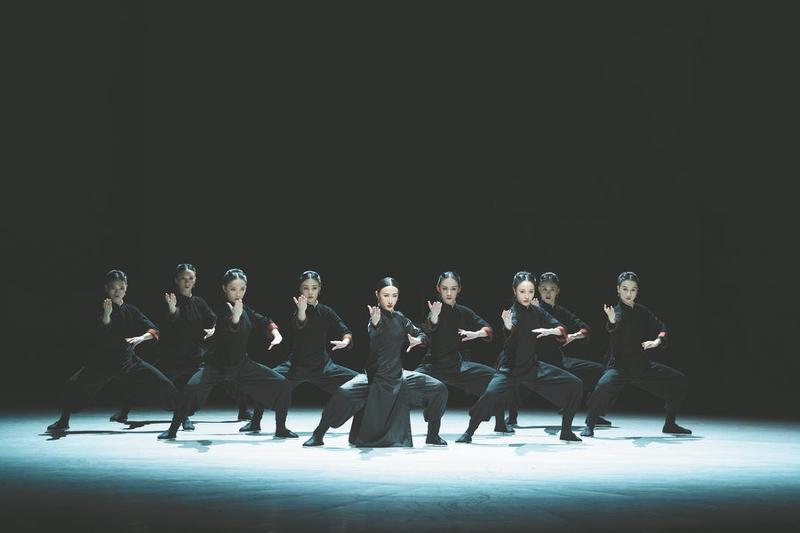 The dance drama, "Wing Chun", features five types of Chinese kung fu, such as wing chun, baguazhang, or eight fixed palms, and tai chi. It will tour around the country this year, aiming to popularize Chinese martial arts as an iconic part of the nation's traditional culture. (PHOTO PROVIDED TO CHINA DAILY)
The dance drama, "Wing Chun", features five types of Chinese kung fu, such as wing chun, baguazhang, or eight fixed palms, and tai chi. It will tour around the country this year, aiming to popularize Chinese martial arts as an iconic part of the nation's traditional culture. (PHOTO PROVIDED TO CHINA DAILY)
One of the most successful and best-selling Chinese dance dramas in 2022 was Poetic Dance: The Journey of a Legendary Landscape Painting, which was inspired by the classic artwork A Panorama of Rivers and Mountains, an 11-meter-long scroll painting by Wang Ximeng from the Song Dynasty (960-1279).
The dance drama has toured the country with more than 200 shows and has won acclaim from audiences, especially young people.
The show's choreography and directing duo Zhou Liya and Han Zhen are ready to bring out a new dance drama, titled Wing Chun, named after a southern Chinese form of kung fu that originated during the Qing Dynasty (1644-1911).
Wing Chun premiered in Shenzhen, Guangdong province, in December and will tour nationwide in 2023, with 80 shows in more than 30 cities.
READ MORE: 'Kung fu grandma' an online sensation at 98
Performed and produced by the Shenzhen Opera & Dance Theatre, the dance drama follows the story of Chinese kung fu masters set against the backdrop of a film shoot taking place during the 1990s and combines five types of Chinese kung fu, such as wing chun, taijiquan, also known as tai chi, and baguazhang, or eight fixed palms.
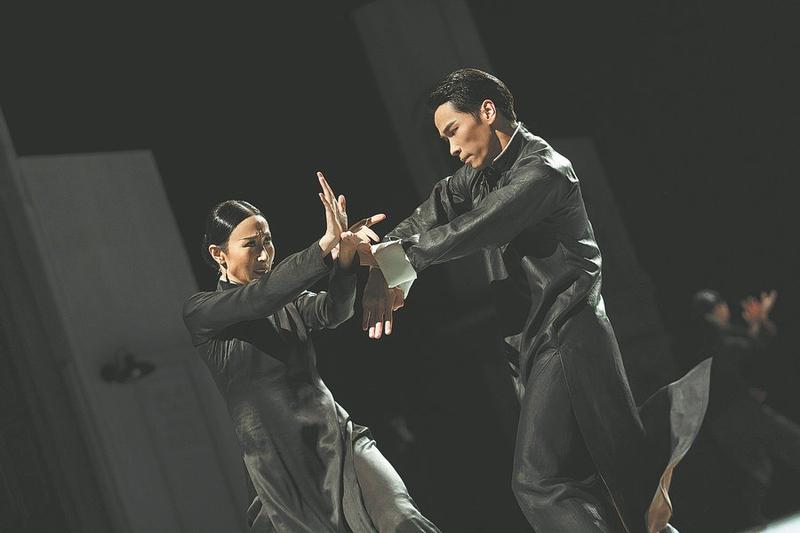 The dance drama, "Wing Chun", features five types of Chinese kung fu, such as wing chun, baguazhang, or eight fixed palms, and tai chi. It will tour around the country this year, aiming to popularize Chinese martial arts as an iconic part of the nation's traditional culture. (PHOTO PROVIDED TO CHINA DAILY)
The dance drama, "Wing Chun", features five types of Chinese kung fu, such as wing chun, baguazhang, or eight fixed palms, and tai chi. It will tour around the country this year, aiming to popularize Chinese martial arts as an iconic part of the nation's traditional culture. (PHOTO PROVIDED TO CHINA DAILY)
On Dec 31, a 13-minute excerpt from Wing Chun, which showcased masters of different kung fu types competing with one another, was featured during the New Year's Eve gala broadcast by Chinese streaming platform Bilibili, a leading multicultural community for the young generation. It received warm feedback from fans.
The livestreamed gala achieved a peak popularity index of 330 million. The excerpt from the dance drama was viewed more than 2 million times.
As we grew up, we still remember and have those feelings of admiration toward kung fu masters and heroes. When we created this dance drama, we brought that feeling to it.
Han Zhen, Choreographer and director
"I cannot wait to watch the dance drama in theaters. I am impressed by the unique display of Chinese kung fu," commented one viewer.
"It's my favorite performance of the gala. I wonder how the dancers were able to fight like real kung fu masters. What it presented was beyond a dance drama," said another.
The two choreographers Han and Zhou were also highly praised by viewers who said that the audience is able to enjoy the beauty of traditional Chinese culture again, just like they accomplished with Poetic Dance: The Journey of a Legendary Landscape Painting.
ALSO READ: Keep calm and ace your moves
"There is no one formula for a great dance drama. We never want to repeat ourselves, and what we did with Wing Chun was a great challenge," says Zhou.
The preparation for the show started in 2021, and was the first time that the two artists had worked on a kung fu-dominated production, though they have done stage productions featuring kung fu elements.
"We traveled to Guangdong province over and over again to seek inspiration and learn more about kung fu. We grew up watching kung fu movies, especially those made during the 1980s and 1990s. Our imagination about kung fu masters and heroes became real by watching those movies. That's why we present the dance drama in the context of a movie set and tell the story through a play-within-a-play structure," says Han.
"As we grew up, we still remember and have those feelings of admiration toward kung fu masters and heroes. When we created this dance drama, we brought that feeling to it," adds Han.
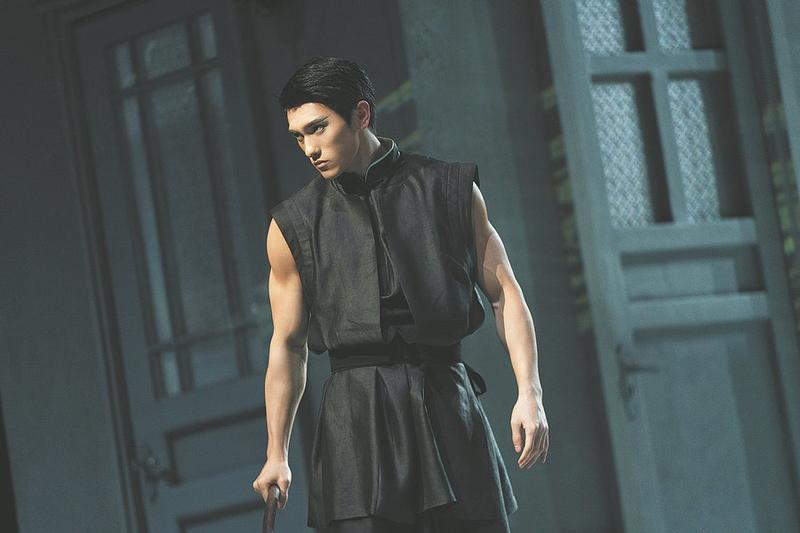 The dance drama, "Wing Chun", features five types of Chinese kung fu, such as wing chun, baguazhang, or eight fixed palms, and tai chi. It will tour around the country this year, aiming to popularize Chinese martial arts as an iconic part of the nation's traditional culture. (PHOTO PROVIDED TO CHINA DAILY)
The dance drama, "Wing Chun", features five types of Chinese kung fu, such as wing chun, baguazhang, or eight fixed palms, and tai chi. It will tour around the country this year, aiming to popularize Chinese martial arts as an iconic part of the nation's traditional culture. (PHOTO PROVIDED TO CHINA DAILY)
Kung fu is, undoubtedly, a symbol of traditional Chinese culture. With a long history and a diversity of forms, kung fu has gained a massive fan following around the world, not just because of the fascinating fighting styles, but also because of the wisdom, philosophy, morality and strategy behind it. Nowadays, kung fu is practiced by people as part of a healthy lifestyle and as a type of sport.
ALSO READ: Getting their kicks with sticks
Kung fu's global appeal is also largely thanks to movies featuring superstars, such as Bruce Lee, Jackie Chan and Jet Li.
Kung fu masters are usually portrayed in movies as virtuous, humble heroes who fight against injustice and foreign encroachment. Like many people, Han and Zhou are fans of kung fu movies, such as the Wong Fei-hung series, which stars martial arts icon Jet Li as the historical martial arts master Wong Fei-hung, and the movie New Dragon Gate Inn, directed by Hong Kong filmmaker Hark Tsui.
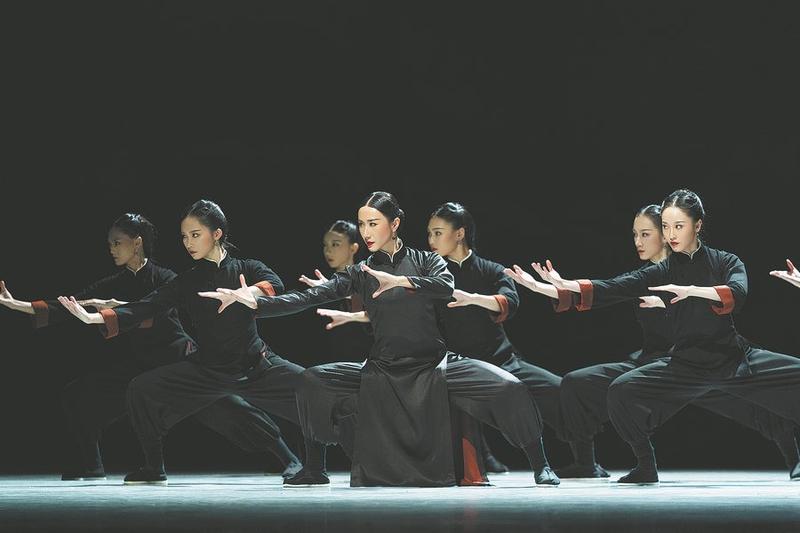 Dancers receive systematic martial arts training before doing rehearsals. (PHOTO PROVIDED TO CHINA DAILY)
Dancers receive systematic martial arts training before doing rehearsals. (PHOTO PROVIDED TO CHINA DAILY)
One of the most famous kung fu masters is Ip Man (1893-1972), who was known for teaching wing chun. Kung fu star Bruce Lee was one of his students.
Born in Foshan, Guangdong province, Ip studied wing chun and went on to become one of the most respected martial arts masters of his time. He died in Hong Kong.
Films about his life were massive hits, especially the Ip Man film series directed by Hong Kong filmmaker Wilson Yip and featuring kung fu star Donnie Yen in the leading role.
READ MORE: Cultural strengths
In the dance drama, Ip is the protagonist who moves to Hong Kong from Foshan and fights for the reputation of wing chun.
"We went to places like Foshan to visit memorial halls and former residential buildings of those kung fu masters, such as Ip. We also talked to different kung fu teachers to learn about the history, tradition and changes to kung fu," recalls Han, adding that there is some original footage of Ip before his death, in which he demonstrated wing chun and wanted to preserve the original practices for future generations.
 Han Zhen (left) and Zhou Liya, choreographers and directors of "Wing Chun". (PHOTO PROVIDED TO CHINA DAILY)
Han Zhen (left) and Zhou Liya, choreographers and directors of "Wing Chun". (PHOTO PROVIDED TO CHINA DAILY)
Instead of simply showcasing different kung fu types, Han and Zhou employed a variety of stage techniques to fulfill their original artistic vision.
For example, since the show is set against the backdrop of Hong Kong in the 1990s, Chinese and Western architecture styles are both presented onstage. They also used elements, such as folding screens with a distinctive Guangdong style, stage design portraying scenes like bamboo forests and narrow lanes in Hong Kong, to go with different fight sequences in the dance drama.
According to Zhou, all the dancers received rigid martial arts training before they actually learned the dance moves. All of the fights are charged with feeling and meaning, showing off the moral and philosophical side of Chinese martial arts.
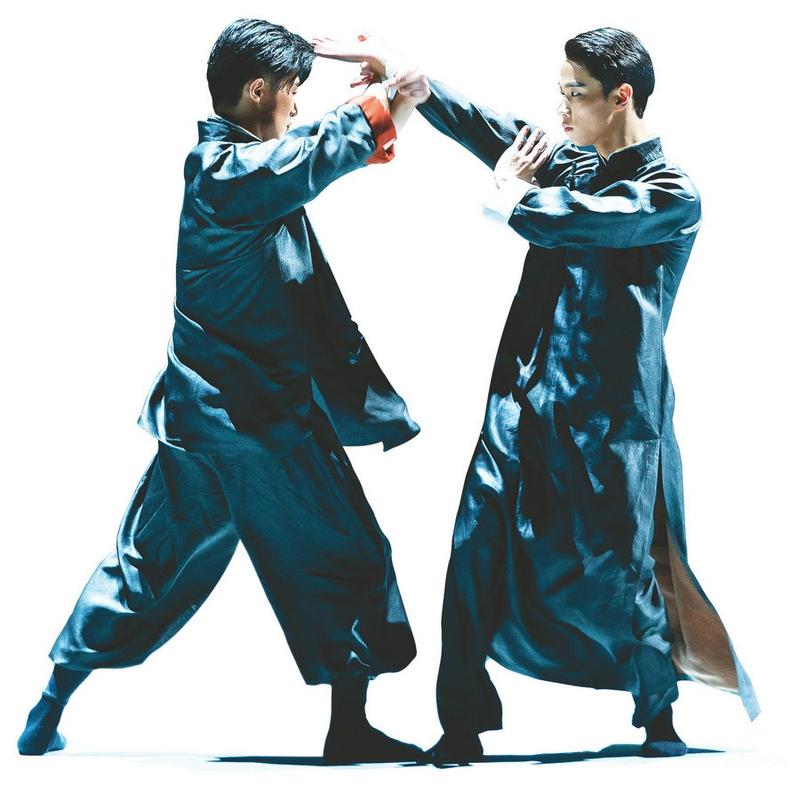 Dancers receive systematic martial arts training before doing rehearsals. (PHOTO PROVIDED TO CHINA DAILY)
Dancers receive systematic martial arts training before doing rehearsals. (PHOTO PROVIDED TO CHINA DAILY)
"It's a great challenge for the dancers since the dance drama is physically consuming," Zhou says.
"They not only need to move with grace, but also with speed and strength, as well as pouring a ton of emotion into the characters."
Zhou adds that she was impressed by the reviews of the audience who watched the excerpt of the dance drama. Some of the viewers even analyzed each fight move showcased in the excerpt.
"We are happy to have a conversation with the audience, either dance lovers or kung fu professionals, through this dance drama, which will popularize kung fu and enable people to have a deeper understanding of this great part of traditional Chinese culture," says Zhou.
Contact the writer at chennan@chinadaily.com.cn


